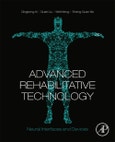Advanced Rehabilitative Technology: Neural Interfaces and Devices teaches readers how to acquire and process bio-signals using biosensors and acquisition devices, how to identify the human movement intention and decode the brain signal, how to design physiological and musculoskeletal models and establish the neural interfaces, and how to develop neural devices and control them efficiently using biological signals. The book takes a multidisciplinary theme between the engineering and medical field, including sections on neuromuscular/brain signal processing, human motion and intention recognition, biomechanics modelling and interfaces, and neural devices and control for rehabilitation.
Each chapter goes through a detailed description of the bio-mechatronic systems used and then presents implementation and testing tactics. In addition, it details new neural interfaces and devices, some of which have never been published before in any journals or conferences. With this book, readers will quickly get up-to-speed on the most recent and future advancements in bio-mechatronics engineering for applications in rehabilitation.
Please Note: This is an On Demand product, delivery may take up to 11 working days after payment has been received.
Table of Contents
1. Introduction2. State of the Art
3. Neuromuscular Signal Acquisition and Pre-Processing
4. EMG-Based Motion Recognition
5. Brain Signal Acquisition and Pre-Processing
6. EEG-Based Brain Intention Recognition
7. Neuromuscular Modelling
8. Neural Interfaces
9. Neural Devices
10. Conclusion








